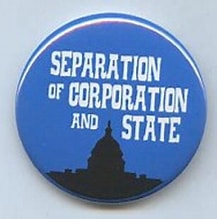The last meaningful bipartisan legislation, McCain-Feingold, was passed in 2002 and it has been eviscerated, legislated against, and ignored ever since. Big Money’s undue influence on American economic spending and economic policy has been the result. The bailout of the Banks that started in 2008 was the real Insurrection in America and it happened quietly and without fanfare in a corporate board room. It created the $700 billion Troubled Asset Relief Program (TARP) to purchase toxic assets from banks. That would not have been an ideal solution to the economic crash, but it would have been better than what did happen, which was to give the money directly to the banks to bolster them and bail them out. Better alternatives were not considered.
The Emergency Economic Stabilization Act of 2008, often called the “bank bailout of 2008,” was proposed by Treasury Secretary Henry Paulson, passed by the 110th United States Congress, and signed into law by President George W. Bush.
Our money should not have been given to the banks as a reward for their intransigence. Many, including myself at the time (I am ashamed to say) bought into the lie that those Banks were “too big to fail”.
Our money should have been used to indemnify the American people, not the profit crazed banking system.
You may tell me that Big Money is merely exercising its Rights of Free Speech with those gigantic contributions to both the Republicans and the Democrats for their campaigns. We all know those out-sized contributions buy access and influence. It’s time to shut the Merry-Go-Round down!
If any candidate in the upcoming election takes up the legacy of McCain-Feingold, we should vote for him or her.
Proposed: Let’s bring McCain-Feingold back and put the brakes on the out-sized influence of Big Money on American politics and American government.
If an Amendment is needed, then we should pass one.


McCain-Feingold was not enough. We must have total political control of campaigns. People before profits–make all banks public property.
Leon said, “McCain-Feingold was not enough.” It was not meant to be the final solution, just a step in the right direction.
You also said, ” We must have total political control of campaigns. People before profits–make all banks public property.”
I could not disagree more!
“…last meaningful bipartisan legislation…”?
On March 10, 2023, NBC said:
“The bill, which would declassify information about the [Corona] virus’ origins and any information linking it to a Chinese lab, passed the House unanimously, 419-0, with 16 members not voting. The Senate passed the measure by unanimous consent last week.”
This qualifies as bipartisan and is certainly meaningful to the sources of intelligence who may be exposed by this act.
Private money in political campaigns is a symptom, not a cause, of your irritation. The cause is government spending and government control of private businesses.
According to usgovernmentspending.com, combined federal, state, and local government spending in 2023 is $10.0 trillion. Investors.com estimates the cost of government-imposed rules at $2 trillion annually. $12 trillion divided by 124 million US households is $97,000 per household per year. 60% of households receive more in public benefits than they pay in taxes (taxfoundation.org).
Citizens, of their own free will, spent $14 billion on the 2020 political campaigns, an average of $110 per household in the most expensive election year so far, about one-tenth of the amount spent on gambling in one year (statistica.com).
The problem is oversized government, not the citizens who try to persuade their fellow citizens to elect representation.
Agreed: no bailouts. Deposit insurance should be private. Abolish all subsidies.
Richard, you rightly called my choice of words into question when I said McCain-Feingold was the “last meaningful bipartisan legislation.” I meant is as a useful exaggeration. The biggest problem we face is that elected officials play fast and loose with the public trust once elected, and that they often voluntarily enter into collaboration with big money donors at the expense of everyone else. It looks to many that our legislators are “bought” by Big Money donors. Lack of trust in our public officials is the one problem we cannot afford to ignore.